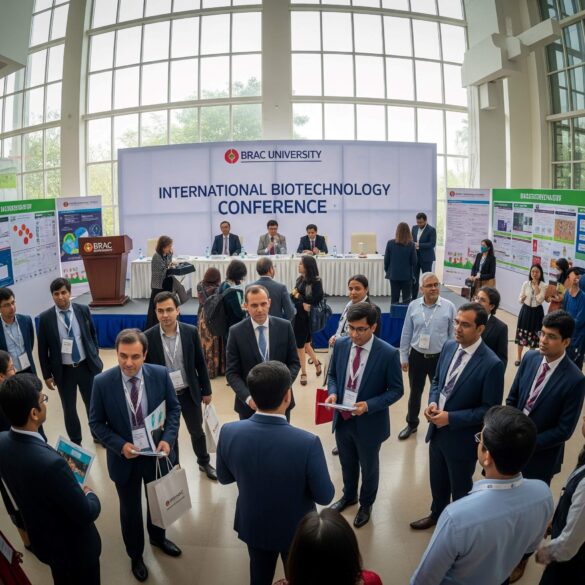A major event in the field of biotechnology concluded recently at BRAC University in Dhaka, highlighting the growing importance of research, innovation, and industry-academic collaboration in Bangladesh. The two-day International Biotechnology Conference 2025 welcomed scientists, students, entrepreneurs, and policy experts from around the world. The gathering focused on biotechnology’s role in solving challenges in healthcare, agriculture, and environmental management—areas gaining attention as Bangladesh looks to strengthen its innovation ecosystem. The conference served as a platform for cutting-edge scientific discussion and practical collaboration. It also underscored the need to bridge research and industry, especially in sectors like healthtech, agritech, and environmental biotech. This was particularly evident in sessions that featured breakthrough research alongside talks on commercialisation strategies and startup growth. In his opening remarks, Professor Md Sayedur Rahman emphasized the need for national investment in science that benefits people directly. He urged students and researchers to pursue work that blends academic knowledge with real-world solutions. Professor Mahbubul Alam Majumdar, Dean of the School of Data and Sciences, echoed this by pointing to the growing relationship between biology and computing, noting how data-driven science can power smarter diagnostics, agriculture, and climate resilience. Throughout the conference, over a hundred scientific papers were presented across key themes such as bioinformatics, genetic engineering, plant biotechnology, medical research, and biosensors. Sessions included discussions on how local innovations can support health services, rural agriculture, and sustainable manufacturing. Many presentations highlighted the urgent need to invest in local research infrastructure so Bangladesh can lead, not just follow, in global biotech conversations. Startups also had a chance to shine. Young entrepreneurs presented new ideas—from rapid diagnostic kits to organic pesticides—showing how university research can translate into market-ready innovations. Discussions on funding, business incubation, and industry partnerships attracted attention from both academic institutions and private investors. On the second day, panel sessions explored ways to encourage youth participation in biotech careers and how to scale up university-led innovations. Speakers from public health, agriculture, and technology sectors spoke about cross-sector partnerships and the importance of equipping graduates with practical and leadership skills. At the closing ceremony, representatives from the National Institute of Biotechnology and BRAC University reaffirmed their commitment to long-term collaboration. Dr Munima Haque, the event’s convener, emphasized that Bangladesh’s future in biotechnology depends on policy support, international networks, and inclusive research opportunities. The conference closed on an optimistic note, with participants agreeing that biotechnology holds promise not just for industry growth but for improving quality of life across the country. Events like this reinforce Bangladesh’s role in shaping global scientific dialogue while nurturing talent at home.
International Biotechnology Conference Concludes at BRAC University
46


